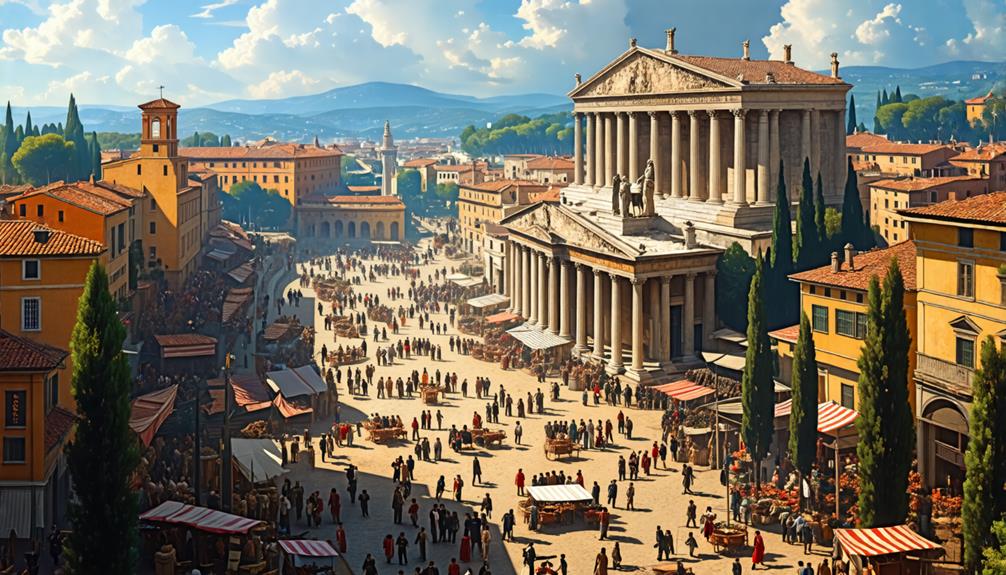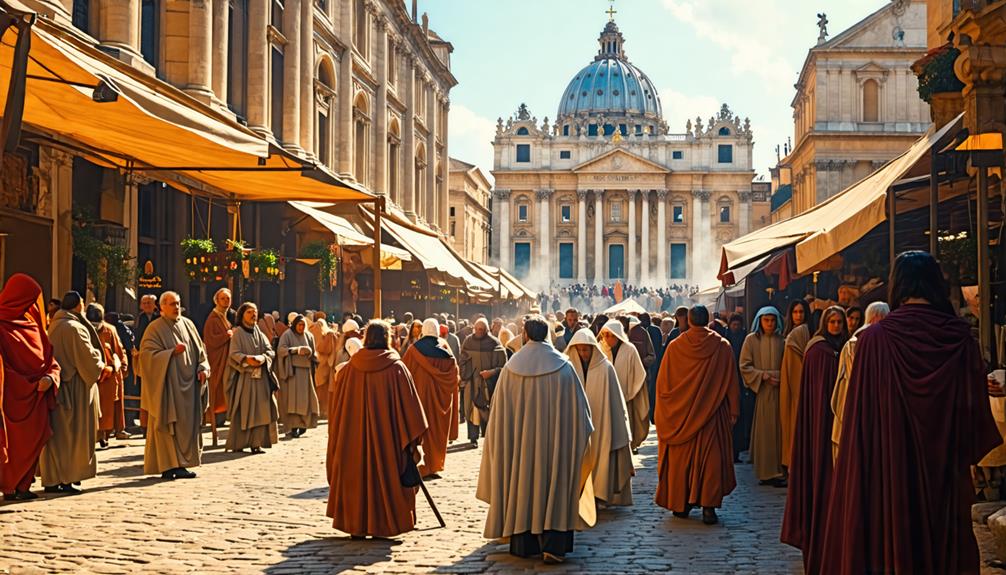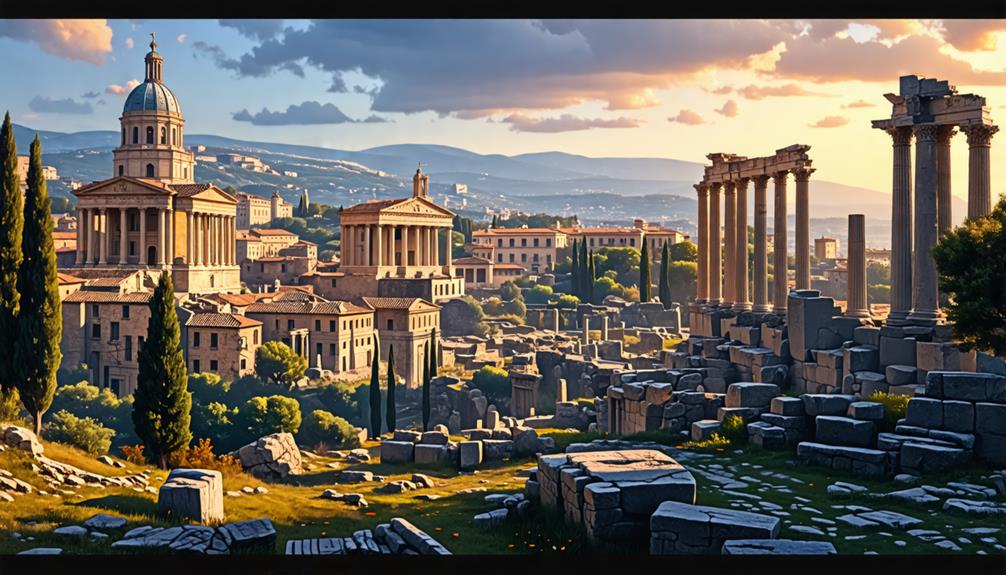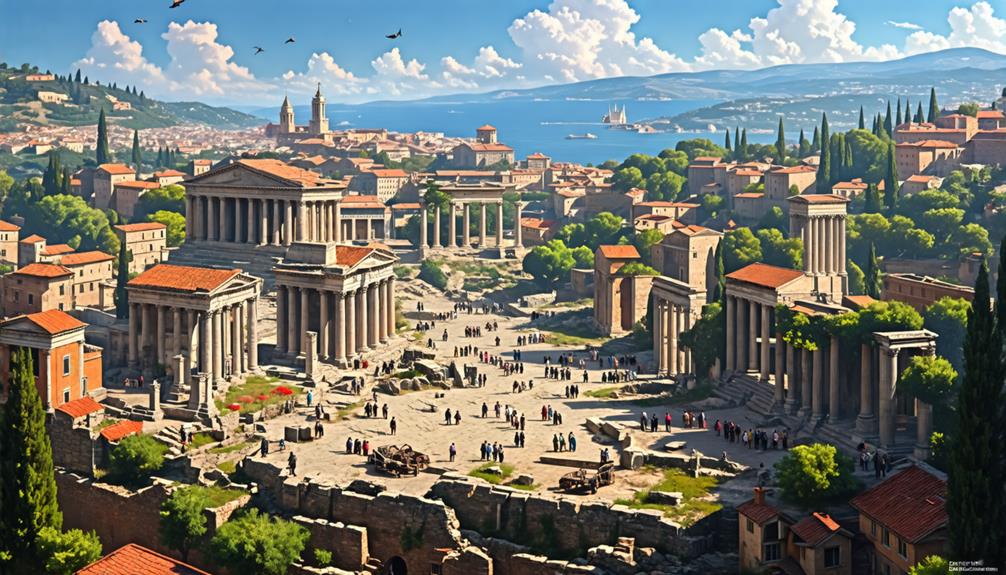The year is 455 CE, and the Vandals are at the gates of Rome. In our timeline, they breached the city's defenses and plundered it for two weeks, but what if they never succeeded?
Let's explore an alternate history where Rome's walls held strong against the Vandal onslaught. How might this event have altered the course of history?
In this scenario, the Western Roman Empire maintains its political stability and economic prosperity. Christianity continues to grow, shaping the cultural landscape of the empire.
However, the threat of Attila's Huns and the persistent migrations of Germanic tribes keep Rome vigilant. The question lingers: how long could the empire have endured, and what legacy would it have left behind?
Political Stability Maintained

One theory is that if the Vandals hadn't sacked Rome in 455 CE, the Western Roman Empire might've maintained political stability for a few more decades. This could have allowed emperors to focus on governing and defending the empire, potentially responding better to internal and external threats.
It's possible that the Western Empire would have eventually fallen to another group, such as the Visigoths or the Ostrogoths, at a later date.
Alternatively, the empire might've fragmented gradually due to various factors like economic decline, political instability, and outside invasions.
Economic Prosperity Continues
Had the Vandals not sacked Rome in 455 CE, the city's economy may have continued to prosper for a period. One theory is that Rome could have remained a center of trade and commerce, with skilled artisans and merchants driving innovation. It's possible this economic vitality would have attracted talent and investment from across the empire for some time.
However, Rome still faced other challenges in the 5th century that could have impacted its trajectory. The Ostrogoths led by Theodoric the Great did conquer most of Italy, including Rome, several decades later in the late 400s.
Christianity's Influence Strengthened

If Christianity's influence had strengthened in the absence of the Vandal sack of Rome, it could have led to several possible outcomes.
One theory is that the faith would have spread more rapidly across the Western Roman Empire, as the Church took advantage of Rome's stability and infrastructure to promote its teachings and convert more people.
It's also possible that a stronger Church could have played a larger role in political and social affairs, potentially shaping the direction of the empire.
However, it's important to note that even if the Vandal sack hadn't occurred in 455 AD, Rome still faced numerous challenges and could have been sacked by another group at a later date, which might've altered the course of Christianity's growth and influence.
Attila's Hunnic Threat
In an alternate historical scenario, the absence of the Vandal sack of Rome in 455 AD could have significantly impacted Attila the Hun's campaign against the Western Roman Empire. One theory suggests that Rome, not weakened by the Vandals, might've been better equipped to defend against the Hunnic invasion, potentially altering the course of history.
However, it's also possible that Attila's campaign would have simply been delayed, with the Huns eventually attacking Rome at a later date.
The Ostrogoths, another Germanic tribe, did sack Rome in 546 AD under the leadership of King Totila, demonstrating that the city remained vulnerable to external threats even without the Vandal sack.
Weakening Eastern Empire

One theory is that if the Eastern Roman Empire had diverted significant resources to support the Western Empire, it could have led to a gradual decline in Constantinople's influence and military strength.
This might've allowed Persia to pose a greater threat, potentially resulting in earlier territorial losses in the East.
It's possible that the Eastern Empire's focus on the West would have come at a heavy cost, weakening its own stability and defenses.
Interestingly, a similar scenario did play out centuries later when the Byzantine Empire under Justinian I reconquered much of the Western Empire in the 6th century AD, overextending itself and contributing to its own eventual decline.
Germanic Migrations Persist
Even without the Vandal sack of Rome, Germanic migrations into the Western Roman Empire may have persisted. Tribes like the Franks, Goths, and Lombards could have continued crossing imperial borders in search of new lands, drawn by the Empire's weakened state and porous frontiers.
One theory is that these migrations would have gradually transformed the Empire culturally and linguistically over a longer period. It's also possible that a later Germanic leader may have eventually conquered Rome, paralleling the Vandals' achievement.
Regardless, the influx of Germanic peoples would likely have reshaped the Western Empire's social and political landscape in the coming centuries.
Lasting Imperial Legacy

In an alternate timeline where Rome didn't fall to the Vandals in 455 CE, the imperial legacy could have persisted for several more generations, influencing Europe's cultural and political landscape.
One theory suggests that Roman institutions, laws, and traditions would have remained dominant for an extended period, with a more gradual shift of power. The Latin language and Christianity might've maintained their preeminence, shaping the region's identity.
While Rome's influence would eventually diminish, its impact on Western civilization could have been more profound and long-lasting.
It's important to note that the Western Roman Empire did eventually fall to Germanic invaders, with the last emperor being deposed in 476 CE. However, the Eastern Roman Empire, also known as the Byzantine Empire, endured until the fall of Constantinople in 1453 CE.
Conclusion
Had the Vandals not pillaged Rome, you might've witnessed a Western Empire standing tall as a beacon of stability and prosperity.
Christianity would've woven its threads more tightly into the fabric of society.
Yet, like a gathering storm, Attila and the Germanic tribes would still have threatened Rome's borders.
The Eastern Empire's struggles and the barbarian migrations would have persisted, but Rome's legacy could have shone brighter, lasting longer in the annals of history.

Leave a Reply